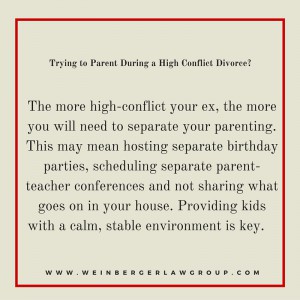High Conflict Divorce: 5 Things Your Therapist Can Do To Help
 The goal of traditional talk therapy is to help clients live and express themselves authentically. When divorcing a high-conflict personality (HCP), however, you need to learn how to be strategic in communicating with your spouse. A therapist who understands how to work with high-conflict divorce can give you the tools to manage your life when your ex is trying to make it unmanageable. Some of these include…
The goal of traditional talk therapy is to help clients live and express themselves authentically. When divorcing a high-conflict personality (HCP), however, you need to learn how to be strategic in communicating with your spouse. A therapist who understands how to work with high-conflict divorce can give you the tools to manage your life when your ex is trying to make it unmanageable. Some of these include…
Learning about personality disorders. You are not dealing with a garden-variety angry ex who will, in time, “get over it.” You are dealing with someone who has borderline and/or narcissistic personality features. The main thing you need to know about people with personality disorders is that they always need a target, and unfortunately, in a divorce situation, that person is you! A divorce therapist can teach you how to stop putting yourself in the position to be targeted, learn what you may be doing to incite drama, and communicate effectively.
Communicating with an HCP. Remember: you are not divorced from someone with whom you can be authentic. This means that you should not apologize (this will just be interpreted as weakness), give an opinion (this will spark a debate), or display emotion (this will invite more attacks). To communicate effectively with an HCP, imagine that you are a journalist reporting a story. If you stick to facts and logistics, you will take give the HCP’s less ammunition with which to bludgeon you.
Explain Parallel Parenting. The parallel parenting paradigm should be used only when attempts at conventional co-parenting have been unsuccessful. HCPs can’t co-parent because they see no value in compromise or problem-solving. They live for creating drama and are willing to use the kids to do it. A therapist can help you accept that you will not have the amicable co-parenting relationship you’d hoped. The more high-conflict your ex, the more you will need to separate yourself and your parenting. This may mean hosting separate birthday parties, scheduling separate parent-teacher conferences and not sharing what goes on in your house.
Boundaries.You probably never learned to set limits with your ex because HCPs don’t recognize that other people have rights. Therefore, you must make firm boundaries. For example: your ex is allowed to call your children once a day, not all day long, during dinner, or past bedtime. Do not be rattled by 24-7 e-mails, texts, and phone calls: respond once a day, preferably after you’ve had time to calm down after reading a diatribe, and edit your reply so it’s not inflammatory. If your custody agreement calls for curbside drop-offs, don’t let your ex pressure you into letting her into your home! She doesn’t get to dictate how your children’s rooms are decorated or how many toys they have.
Disengage. Partners of HCPs are trauma survivors and exhibit symptoms of PTSD victims. They’re hyper-vigilant, they ruminate about past crises and obsess about future ones, they exist in a perpetual state of emotional chaos, and they talk way too much about every terrible thing the HCP has ever done. Living like this is exhausting! A therapist can give you tools to shift your emotional energy from your ex back where it belongs: on yourself and your children.
Strategic, limited disclosures and firm boundaries are essential tools in the management of high-conflict divorce. With help from your therapist, you can learn how to hold on to your sense of self while disengaging from your crazy-making ex.
Do you need help with legal side of divorcing your high conflict personality spouse? Our powerful team of family law attorneys are here to guide you in finding solutions in your divorce matter that protect and secure you and your children. Please contact us to schedule your initial consultation.


